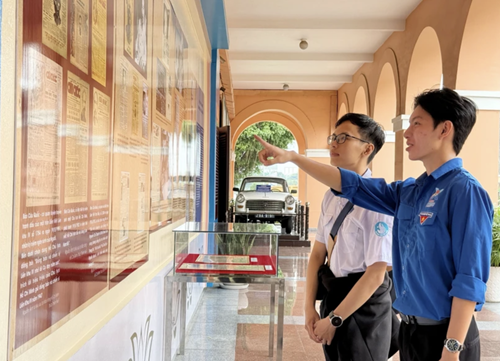This meaningful event aims to commemorate the 135th birth anniversary of President Ho Chi Minh (May 19, 1890 – 2025), the 114th anniversary of his departure to seek a way for national salvation (June 5, 1911), and the 100th anniversary of the Vietnam Revolutionary Press Day (June 21, 1925).
    |
 |
|
Students visit the exhibition. |
It showcases more than 100 valuable documents and artifacts, divided into two main parts: “Journalist Nguyen Ai Quoc – Ho Chi Minh” and “President Ho Chi Minh – Founder and Mentor of Vietnamese Revolutionary Press.” This is an opportunity to recall the late leader’s journalism journey and affirm his exceptional role in founding and guiding the revolutionary press in Vietnam.
Nguyen Thi Kim Lien, from the Ho Chi Minh Museum – HCM City branch, stated that the late President was not only a hero of national liberation and an outstanding cultural figure but also a great revolutionary journalist. Throughout his revolutionary life, he founded nine newspapers both inside and outside the country. He left behind more than 2,000 articles of various genres, nearly 300 poems, and almost 500 pages of short stories and memoirs. He used around 182 pen names and wrote in multiple languages, including Vietnamese, French, English, Russian, and Chinese. He also collaborated with many major newspapers in France, the UK, Russia, and China.
Notably, in 1925, at House No. 13, now No.248 - 250, Wenming Road, Guangzhou, Nguyen Ai Quoc founded the “Thanh Nien” (Young People) Newspaper, the official publication of the Vietnam Revolutionary Youth League. This was the first revolutionary newspaper of Vietnam, marking the beginning of Vietnam’s revolutionary and proletarian journalism.
The exhibition aims to highlight President Ho Chi Minh’s role in founding “Thanh Nien” and in training the country’s first generation of proletarian journalists. It also features some of his most notable articles associated with key periods in the nation’s history, from the August Revolution and the resistance war against French colonialism to the resistance war against US imperialism. Through this, it affirms that Vietnam’s press serves as a vivid and heroic chronicle of the nation’s journey in building and defending the Fatherland.
Source: VNA